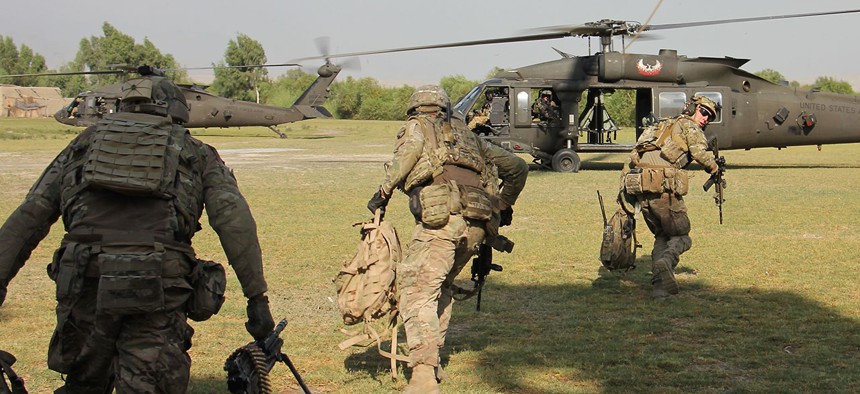
Capt. Jarrod Morris/Army file photo
Trump Advisers Call for More Troops in Afghanistan
The request recommends sending at least 3,000 U.S. troops to break the military stalemate in the country.
President Trump’s senior military and foreign advisers have called for expanding the U.S. military presence in Afghanistan in an effort to pressure the Taliban to negotiate with the Afghan government and break the military deadlock in what has been dubbed the U.S.’s longest war.
The proposal, first reported by The Washington Post and The New York Times, calls for sending at least 3,000 additional U.S. troops to join the 13,000 NATO troops currently in the country (8,400 of whom are American), as well as a request for more NATO troops from allied countries. It also calls for giving the Pentagon more authority to set troop levels in Afghanistan and the military broader reach to target Taliban leaders using airstrikes without White House involvement. The proposal also aims to reduce Obama-era restrictions on U.S. military advisers’s role on the battlefield.
The plan, which would require the president’s approval, follows a policy review of the U.S. role in Afghanistan. Though Trump’s strategy for Afghanistan is unclear—he has previously called for the U.S. to “get out of Afghanistan” but has also expressed his desire to “make progress alongside our Afghan partners and NATO allies”—he is expected to make a decision before the May 25 NATO summit in Brussels.
Such requests are hardly new. General John W. Nicholson, the top U.S. commander in Afghanistan, called for expanding the U.S.’s military presence to the Senate Armed Services Committee in February, during which he warned that U.S. and NATO troops were facing a “stalemate,” adding that they have a “shortfall of a few thousand.”
Though the Trump administration has increased the pace of U.S. airstrikes in Afghanistan, it has mostly focused on the Islamic State, which first emerged in the country in January 2015. The U.S. last month dropped the “mother of all bombs” on an ISIS facility in Afghanistan’s Nangarhar province, which is considered an ISIS stronghold, and on Sunday announced the killing of an ISIS leader during a special-operations forces raid conducted by U.S. and Afghan forces in that same region.
NEXT STORY: Employees Evacuated from Washington Nuclear Site







